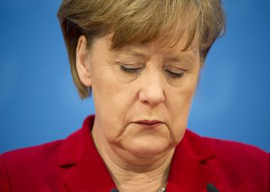
November 20, 2011

Angela Merkel
Other politicians, such as Gregor Gysi of the Party of Democratic Socialists (read: retread communists) and the chancellor (who represents something that substitutes for Germany’s center-right), argue that if the Greeks do not receive German economic aid, all hell might break loose. The EU could be endangered, with Germany thereafter propelled toward a national resurgence that could threaten peace in Europe. The Krauts, it seems, aren’t quite ready for political prime time. All the wars they’ve unleashed (supposedly with zero help from the other side) show that they have to be imprisoned in some international structure lest they feel tempted to act out. From reading such descriptions, one gets the impression that the EU must be kept intact as a loony bin for a psychotic country.
Perhaps the most comical argument for bailing out Greece has come from Merkel’s CDU Labor Minister and outspoken feminist Ursula von der Leyen, who has been vocal in her support for “helping the Greeks get back on their feet.” In a recent appearance on a weekend talk show hosted by TV celebrity Günther Jauch, Ms. von der Leyen went after those who criticize Greece’s spending habits and bloated state bureaucracy. According to van der Leyen, such a captious judgment does not take into account the close resemblance between the “Greeks at the present hour and the Germans in 1945, when we were a battered people.” To the Labor Minister, assisting the Greeks seems the proper thing to do. It is “like the CARE-packages that the Americans sent us after the War.”
This last comparison borders on the lunatic, except when a German politician is trying to be “nice.” Then it simply reflects the dominant national culture. Perhaps the Germans should insist on a fundamental right which the Americans once exercised: to carpet with bombs an enemy country and then hang its leaders as war criminals. Once having done this, the Germans could get on with the good stuff, such as providing those they’ve mercilessly “battered” with chocolate bars and sewing kits. Like other German politicians, von der Leyen is accustomed to the double kowtow (der doppelte Kotau), which involves simultaneously sucking up to the Yankees and non-German Europeans. Whereas Germans were once feared for lunging at their neighbors’ necks, now they’re delighted to be at everyone’s feet.
Presumably the banks, which made loans to the Greeks at the German government’s urging, will have to be saved as a first step to dealing with Greek insolvency. An article in the relatively right-wing Preußische Allgemeine Zeitung explains a ridiculous situation: The Germans have the same representation in the EU Council as Cyprus and Malta combined, yet they contribute 28% of the organization’s available capital as opposed to the 0.3% given by Cyprus and Malta. Germans are watching their earnings decline while paying for other countries’ insolvency, yet they seem determined to make their problem even worse. Although Germans gripe about the bailout, the vast majority support leftist parties that will give away even more of their money to foreign governments. German voters snub and even despise parties such as the Republikaner which oppose the bailouts.
The Republikaner, who have been critical of Muslim immigration and bailouts and whose members favor a freer market economy, had been under the surveillance of the Verfassungsschutz, a German agency set up to monitor “extremist” parties thought to threaten the German constitutional order. The surveillance soon ended because there is nothing about the party that could possibly threaten the German constitution. The major “democratic” parties, including the former communist party, had a hand in influencing the decision to investigate their opponents’ “extremism,” and the cloud under which they arranged to place the Republikaner with the partisan Verfassungsschutz worked well. Their incipient opposition received no more than 0.4 percent of the votes cast in the 2009 general elections. By contrast, the antinational, antifascist, socialist bloc is expected to run the next German government.
Given the systematically instilled distrust of themselves and their history, one must assume that German voters will follow their antifascist chancellor, who in the face of collapsing EU economies has called for a “far more unified Europe.” Merkel hopes to strengthen the EU prison house created for her country of would-be juvenile delinquents.